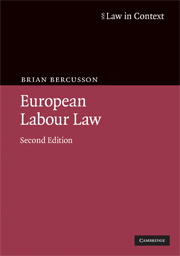Preface
Published online by Cambridge University Press: 05 June 2012
Summary
The first edition of this book was published in 1996, and although it was by no means the first book on the subject, it was in some way the most original, stimulating and rigorous. As well as being also the most comprehensive in terms of the issues covered, it was the first convincingly to make the case for European Labour Law as a wide-ranging discipline in its own right, with a distinct identity separate from national labour law systems, but influenced by them. Such visionary thinking was to elevate the debate about European Labour Law at a time when, imperfectly schooled in EC law, many British labour lawyers in particular encountered EC Labour Law only collaterally through matters like equal pay or the transfer of undertakings, and then sometimes only cautiously, nervously and reluctantly.
There are now many more books on European Labour Law which have been published since 1996. But few show the same learning, the same experience, or the same understanding of the subject as are revealed in the pages that follow. Indeed, this volume is only Part One (the General Part) of what had been intended as a two volume enterprise (with Part Two (the Special Part) being an examination of the substance of the law). As such, the present volume is concerned principally with the evolution, development and identity of European Labour Law; the process by which European Labour Law is made (notably by Social Dialogue as a means of setting and implementing labour standards), and the emerging constitutionalisation of labour rights, notably in the EU Charter of Fundamental Rights of 2000.
- Type
- Chapter
- Information
- European Labour Law , pp. ix - xiiPublisher: Cambridge University PressPrint publication year: 2009

